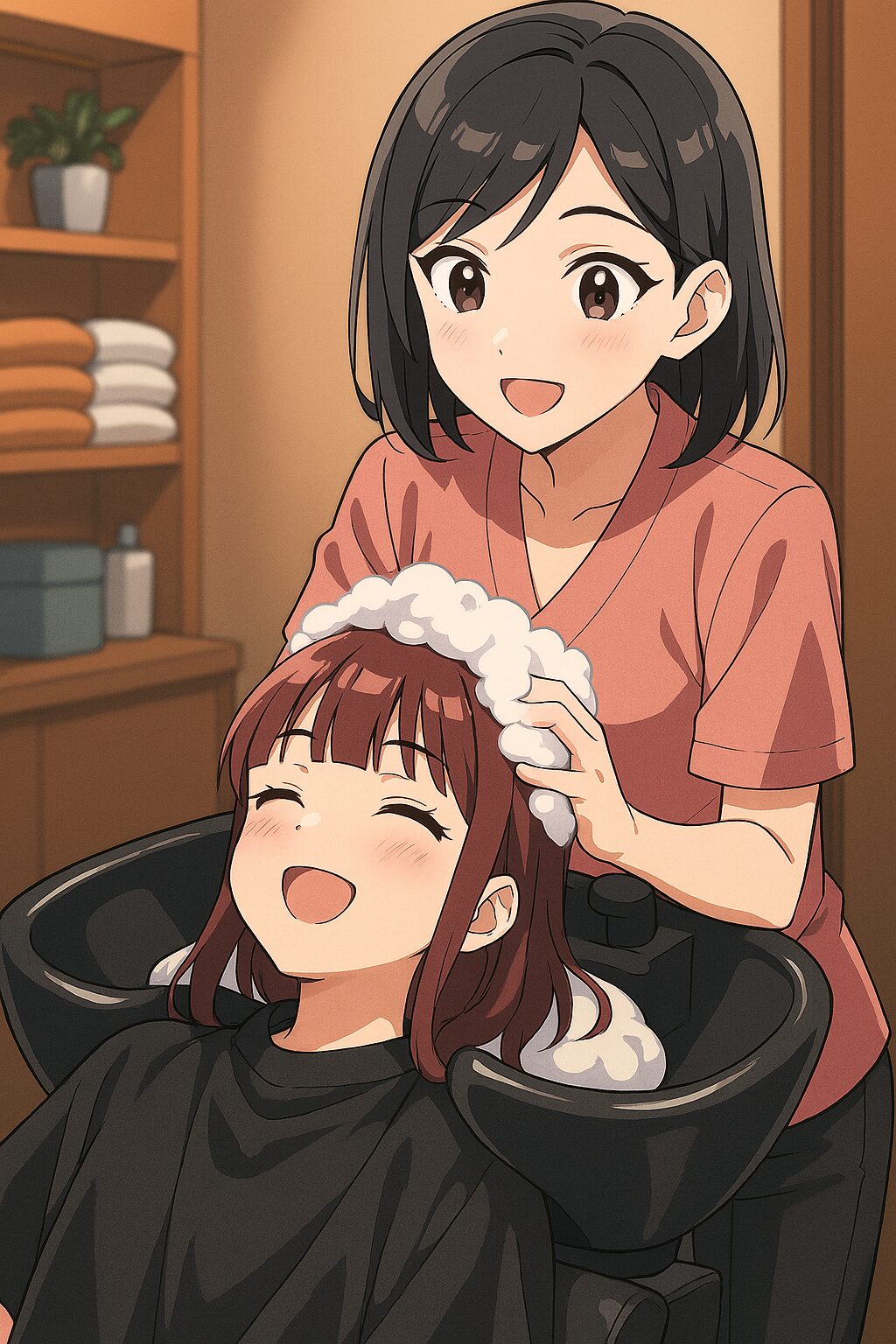When visiting Japan, many travelers are amazed not only by the sights and cuisine, but by the subtle, heartfelt hospitality woven into everyday life. This story follows a European friend’s first visit to a Japanese hair salon—an experience that left them deeply moved and culturally curious.
- A Gentle Surprise: Hospitality at the Hair Salon
- What Makes Japanese Hair Salons Unique?
- Efficiency vs. Empathy: A Cultural Contrast
- Why Is Omotenashi So Important in Japan?
- Can Foreign Visitors Use Japanese Salons Easily?
- After the Visit: A New Curiosity for Japanese Healing Culture
- Conclusion: Small Moments, Deep Connections
- ヨーロッパの友人が体験した、日本のヘアサロンの“やさしさ”
- 日本のヘアサロン文化とは?サービスの流れと特徴
- ヨーロッパとの違い:効率 vs 心づかい
- なぜ日本では“おもてなし”が大切にされるのか?
- 外国人でも安心して利用できる?言語サポートと予約方法
- 友人のその後:日本の“癒し”に魅了されて
- 結び:小さな体験が文化理解につながる
A Gentle Surprise: Hospitality at the Hair Salon
While staying in Kyoto, a European friend decided to get a haircut. Despite speaking little Japanese, they booked a nearby salon. Upon arrival, they were warmly greeted, and the staff kindly communicated in simple English.
What surprised them most wasn’t the haircut or coloring—it was the soothing head massage before and after the treatment. The shampoo station felt like a spa, and the quiet, peaceful atmosphere made the entire visit feel like a moment of healing.
“I thought salons were just for cutting hair,” they said. “But in Japan, it’s like a place to reset your mind.”
What Makes Japanese Hair Salons Unique?
- Consultation: Stylists take time to understand your hair type and preferences, offering thoughtful suggestions.
- Shampoo & Massage: Gentle scalp massages during shampooing help you relax—some guests even fall asleep.
- Cut, Color, or Perm: Skilled stylists pay close attention to detail, ensuring a polished finish.
- Aftercare Advice: You’ll receive tips on styling and maintaining your hair at home.
Throughout the process, comfort and care are prioritized—hallmarks of Japanese service culture.
Efficiency vs. Empathy: A Cultural Contrast
In many European salons, efficiency is key. Services are quick and professional, but rarely include massages or emotional care.
In Japan, the philosophy of “the customer is god” still influences service industries. Salons are designed not just to beautify, but to soothe and uplift. Every gesture reflects a deep-rooted culture of empathy and attentiveness.
Why Is Omotenashi So Important in Japan?
Omotenashi is more than hospitality—it’s the art of anticipating someone’s needs without being asked. It’s seen in tea ceremonies, traditional inns, and even everyday interactions.
At salons, staff may notice if you’re tired or nervous and respond with gentle words or a calming massage. It’s a quiet, intuitive form of care that speaks volumes.
Can Foreign Visitors Use Japanese Salons Easily?
Yes! Many salons now offer English menus, translation apps, and online booking systems. Some even specialize in serving international guests.
For example, this site helps travelers find English-friendly salons across Japan:
After the Visit: A New Curiosity for Japanese Healing Culture
After the salon visit, my friend became curious about other forms of Japanese relaxation—onsen hot springs, quiet cafés, traditional inns, and even shrines. “Japan has so many places to calm your heart,” they said, smiling peacefully.
Conclusion: Small Moments, Deep Connections
Japan’s charm isn’t just in its famous landmarks or cuisine. It’s in the everyday kindness—like a head massage at a local salon—that opens hearts and builds cultural bridges.
If you visit Japan, don’t miss the chance to experience a neighborhood hair salon. You may walk out not only with a new hairstyle, but with a new perspective on care and connection.
初めての日本のヘアサロンで感動!ヨーロッパの友人が驚いた“おもてなし”体験とは?
日本を訪れる外国人旅行者の多くが驚くのは、観光地や食文化だけではありません。日常の中にある、さりげない「おもてなし」に心を打たれることが少なくないのです。
ヨーロッパの友人が体験した、日本のヘアサロンの“やさしさ”
京都で滞在中のヨーロッパ出身の友人が、近くのヘアサロンに予約を入れてみることに。日本語はほとんど話せないものの、スタッフは笑顔で迎えてくれ、英語での簡単なコミュニケーションにも快く対応してくれました。
驚いたのは、カットやカラーの前後に行われる「ヘアマッサージ」。シャンプー台での頭皮マッサージは、まるでスパのような心地よさ。施術中も静かで落ち着いた空間が保たれ、まるで“癒しの時間”を過ごしているかのようだったといいます。
日本のヘアサロン文化とは?サービスの流れと特徴
- 受付とカウンセリング:髪の悩みや希望を丁寧に聞いてくれる。スタイルの提案も親身。
- シャンプーとマッサージ:専用のシャンプー台で、頭皮を優しくマッサージ。リラックス効果が高く、眠ってしまう人も。
- カット・カラー・パーマなどの施術:技術力の高いスタイリストが、細部までこだわって仕上げてくれる。
- 仕上げとアフターケアのアドバイス:スタイリングの方法や、日々のケアについても丁寧に説明してくれる。
ヨーロッパとの違い:効率 vs 心づかい
ヨーロッパの美容室では、効率的な施術が主流。カットやカラーは迅速に行われ、マッサージや丁寧な接客はあまり見られません。
日本では「お客様は神様」という考え方が根強く、サービス業全体に“おもてなし”の精神が浸透しています。美容室も例外ではなく、来店した人が心地よく過ごせるよう、細やかな配慮がなされているのです。
なぜ日本では“おもてなし”が大切にされるのか?
日本の「おもてなし」は、単なるサービスではありません。相手の気持ちを察し、先回りして行動する“心の文化”です。
これは、茶道や旅館文化にも通じるもの。たとえば、京都の老舗旅館では、客が何も言わなくても、好みや体調に合わせた料理や室温調整が行われます。
ヘアサロンでも同様に、言葉にしなくても「疲れているのかな」「緊張しているかも」と察して、マッサージや声かけをしてくれるのです。
外国人でも安心して利用できる?言語サポートと予約方法
最近では、外国人観光客の増加に伴い、英語対応のヘアサロンも増えています。以下のようなサービスを提供する店舗もあります:
- 英語メニューやスタイルブックの用意
- 翻訳アプリを使ったコミュニケーション
- 事前予約が可能なオンラインサイト
たとえば、以下のサイトでは、外国人向けに日本の美容室を紹介しています:
友人のその後:日本の“癒し”に魅了されて
ヘアサロンでの体験をきっかけに、友人は「もっと日本の“癒し文化”を知りたい」と言い出しました。温泉、旅館、カフェ、さらには神社での静かな時間まで、興味の幅が広がったようです。
「日本では、日常の中に“心を整える場所”がたくさんあるんだね」と語る彼の表情は、どこか穏やかで、満たされたように見えました。
結び:小さな体験が文化理解につながる
日本の魅力は、観光地やグルメだけではありません。こうした日常の中にある“おもてなし”こそが、深い感動を呼び起こすのです。
ヘアサロンでの一時間が、異文化理解の扉を開く。そんな体験を、もっと多くの人に届けたいと思います。
日本を訪れる際は、ぜひ一度、地元のヘアサロンに足を運んでみてください。そこには、言葉を超えた“やさしさ”が待っています。



コメント